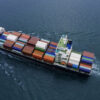5 Natural Events That Make Shipping Difficult
Natural events can cause insurmountable damage to both public and private infrastructure. The shipping industry is directly affected due to these delays in standard operations. Delivery times are often extended, transit routes may be altered due to blocking or dangerous road conditions and port congestion occurs as freight sits, undelivered. Industry employees are also at risk during a natural event and companies must protect them as well.
- BLIZZARDS
During a major snowstorm, access to normal delivery routes will be affected. The impact can be felt for several days if not longer as conditions improve. - ICE
Ice is another dangerous condition for the shipping industry. Icy roads, runways, and planes can cause major delays and unpredictable schedules. It must safe for workers and also the cargo being transported to return to service. - LANDSLIDES
In remote locations with few passable roads, a major landslide can be devastating to travel. The movement of debris can be falling rock or partial slides or classified as spreads or flows. Depending on the severity of the situation, roads would need to be cleared and then the area must be stabilized before traffic flow can resume. During this delay, alternate routes and even alternate methods of transport may be required to deliver with minimal delays. - VOLCANIC ERUPTIONS
There are about 80 volcanic areas in the Alaska Peninsula and Aleutian Islands region. The impact of eruption events has been felt as recent as just a few short years ago. When ash particles, smoke, and gases are released high into the air, it can become dangerous to fly normal routes. The Alaska Air Forwarding office in nearby Dutch Harbor was prepared to respond to the unexpected changes and we monitored conditions proactively. - FLOODS
During flooding events, shippers must once again reroute freight until the waters recede, which causes delays. We can look for alternate shipping options and carefully watch weather conditions in anticipation of issues.
It is extremely important for shipping businesses to have a game-plan for dealing with any natural hazards that can occur.
- Preparedness – This process plans for a variety of possible incidents and outlining procedures to recovery.
- Response - Even if the event itself was short-lived, it is often the damage that is left behind that can hamper recovery efforts. So the transportation industry must determine the impact and prepare a response.
- Recovery - This process can take time depending on the situation and the effectiveness of the response plan. Every day of disruption means loss of profit and can negatively impact client relations. After this phase, when regular service has been restored, it is important to re-evaluate the preparedness plan and response procedures to minimize loss during future events.
Alaska Air Forwarding works through natural events to reduce delays. We know how to handle just about anything that comes our way.






